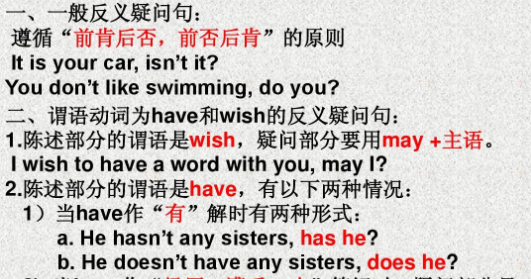本文目录
英语中反义疑问句的回答方式
对于反义疑问句,汉语的答语先判断对方陈述的那个观点,然后说事实。英语则一直关注事实本身,对事实本身进行对错判断。
用yes, no。
但是,当陈述部分是否定形式时,回答要按事实。
如: They don’t work hard, do they? 他们不太努力工作,是吗?
——Yes, they do. 不, 他们工作努力。
——No, they don’t. 对, 他们工作不努力。

不定代词
当陈述部分的主语是
(1)one时,后面的疑问句可用one/he。
(2)no one时,后面附加疑问句中主语用they。
(3)everything,anything,nothing,something时,附加疑问句中主语用it 不用they。
(4)this, that,或those, these时,附加疑问句中主语用it或they。
(5)everyone,everybody,someone,somebody,anyone,nobody等时,附加疑问句中主语一般用they(口头语,非正式文体)/he(正式文体)。
反义疑问句用法
1.反义疑问句(The Disjunctive Question 或 Question tags,分离疑问句或疑问标签句),
又叫附加疑问句,是指当提问的人对前面所叙述的事实不敢肯定,而需要向对方加以证实时所提出的问句。附加疑问句由两部分组成:前一部分是一个陈述句,后一部分是一个简短的疑问句,两部分的人称时态应保持一致。
2.句子公式:
(1)陈述部分肯定式+疑问部分否定式
(2)陈述部分否定式+疑问部分肯定式 。
陈述部分和疑问部分可能是前肯后否,也可能是前否后肯。这类反义疑问句有时带有感情色彩,表示惊奇、愤怒、讽刺、不服气、疑惑、嫉妒……例如:You call this a day's work,don't you?你说这就叫一天的活儿,不是吗?
3.例句
(1)陈述部分肯定句+疑问部分否定句(可记为前肯后否)。
例:They work hard, don't they?
他们努力工作,不是吗?
Let's go to the supermarket ,shall we?
让我们去超市,好吗?
(2)陈述部分否定句+疑问部分肯定句(可记为前否后肯)。
例:You didn't go, did you?
你没去,是吗?
4.反义疑问句的回答。
反义疑问句的回答:前肯后否,前否后肯,根据事实从后往前翻译。但不管是前否后肯,还是前肯后否形式的反义疑问句,回答都根据事实回答,肯定的答案就用 yes+ 肯定结构,否定的答案就用 no+ 否定结构,答案要和实际情况相符。也叫实事求是。如:
(1)They work hard,don't they?他们努力工作,不是吗?
Yes, they do.对,他们工作努力。/No, they don't.不,他们工作不努力
(2)They don't work hard, do they? 他们不太努力工作,是吗?
Yes, they do. 不,他们工作努力。/No, they don't. 是的, 他们工作不努力
英语反意疑问句例句0个带翻译的句子
反义疑问句(The Disjunctive Question)
即附加疑问句.它表示提问人的看法,没有把握,需要对方证实.
它表示提问人的看法,没有把握,需要对方证实.反义疑问句由两部分组成:前一部分是一个陈述句,后一部分是一个简短的疑问句,两部分的人称时态应保持一致.
1.陈述部分肯定式+疑问部分否定式
2.陈述部分否定式+疑问部分肯定式
They work hare,don’t they?
She was ill yesterday,wasn’t she?
You didn’t go,did you?
He can’t ride a bike,can he?
请注意以下句型的反义疑问句的用法:
1.当陈述部分的主语是I ,everyone,everything,nobody 时,后面的疑问句应表示为:
I am a student,aren’t I
Everyone is in the classroom,aren’t they?
Everything begins to grow in spring,doesn’t it?
Nobody will go,will they?
2.当陈述部分有never,seldom,hardly,few,little,barely,scarcely,nothing 等否定词时,后面的疑问句则表示为:
There are few apples in the basket,are there?
He can hardly swim,can he?
They seldom come late,do they?
3.当陈述部分是I think 加从句时,疑问句应和从句的人称时态保持一致.
I think chickens can swim,can’t they?
I think Lucy is a good girl,isn’t she?
I didn't think he was happy,was he?
4.陈述部分有had better 时,疑问句应用hadn’t开头:
you’d better get up early,hadn’t you?
5.当陈述部分是祈使句时,疑问句要根据语气来表达
Let’s go out for a walk,shall we?
Let us go our for a walk,will you?
Turn on the radio,will you?
6.反义疑问句的回答用yes,no,但是,当陈述部分是否定形式时,回答要按事实.如:
They don’t work hard,do they?他们不太努力工作,是吗?
Yes,they do.不,他们工作努力./No,they don’t.对,他们工作不努力.
反义疑问句的回答
反意疑问句的回答
对反意疑问句的回答,无论问题的提法如何,如果事实是肯定的,就用yes,事实是否定的,就要用no。要特别注意陈述句部分是否定结构,反意疑问句部分用肯定式提问时,回答yes或no与汉语正好相反。这种省略回答的yes要译成“不”,no要译成“是”。
例 ---He likes playing football, doesn’t he? 他喜欢踢足球,是吗?
---Yes, he does. / No, he doesn’t. 是的。/ 不是。
---His sister didn’t attend the meeting, did she? 他妹妹没有参加会议,是吗?
---Yes, she did. / No, she didn’t. 不,她参加了。/ 是的,她没参加。
简要总结反意疑问句19条:
1) 陈述部分的主语是I,疑问部分要用 aren't I.
I'm as tall as your sister,aren't I?
2) 陈述部分的谓语是wish,疑问部分要用may +主语。
I wish to have a word with you, may I?
3) 陈述部分用 no, nothing, nobody, never, few, seldom, hardly, rarely, little等否定含义的词时,疑问部分用肯定含义。
The Swede made no answer, did he / she?
Some plants never blown (开花), do they ?
4) 含有ought to 的反意疑问句,陈述部分是肯定的,疑问部分用shouldn't / oughtn't +主语。
He ought to know what to do, oughtn't he? / shouldn't he?
5) 陈述部分有have to +v. (had to + v.),疑问部分常用don't +主语(didn't +主语)。
We have to get there at eight tomorrow, don't we?
6) 陈述部分的谓语是used to 时,疑问部分用didn't +主语或 usedn't +主语。
He used to take pictures there, didn't he? / usedn't he?
7) 陈述部分有had better + v. 疑问句部分用hadn't you?
You'd better read it by yourself, hadn't you?
8) 陈述部分有would rather +v.,疑问部分多用 wouldn't +主语。
He would rather read it ten times than recite it, wouldn't he?
9) 陈述部分有You'd like to +v. 疑问部分用wouldn't +主语。
You'd like to go with me, wouldn't you?
10) 陈述部分有must 的疑问句,疑问部分根据实际情况而定。
He must be a doctor, isn't he?
You must have studied English for three years, haven't you? / didn't you?
He must have finished it yesterday, didn't he?
11) 感叹句中,疑问部分用be +主语。
What colours, aren't they?
What a smell, isn't it?
12) 陈述部分由neither… nor, either… or 连接的并列主语时,疑问部分根据其实际逻辑意义而定。
Neither you nor I am engineer, are we?
13) 陈述部分主语是指示代词或不定代词everything, that, nothing, this, 疑问部分主语用it。
Everything is ready, isn't it?
14) 陈述部分为主语从句或并列复合句,疑问部分有三种情况:
a. 并列复合句疑问部分,谓语动词根据邻近从句的谓语而定。
Mr. Smith had been to Beijing for several times, he should have been in China now, shouldn't he?
b. 带有定语从句,宾语从句的主从复合句,疑问部分谓语根据主句的谓语而定:
He is not the man who gave us a talk, is he?
He said he wanted to visit Japan, didn't he?
c. 上述部分主句谓语是think, believe, expect, suppose, imagine等引导的定语从句,疑问部分与宾语从句相对应构成反意疑问句。
I don't think he is bright, is he?
We believe she can do it better, can't she?
15) 陈述部分主语是不定代词everybody, anyone, somebody, nobody, no one等,疑问部分常用复数they,有时也用单数he。
Everyone knows the answer, don't they? (does he?)
Nobody knows about it, do they? (does he?)
16) 带情态动词dare或need的反意疑问句,疑问部分常用 need (dare ) +主语。
We need not do it again, need we ?
He dare not say so, dare you?
当dare, need 为实义动词时,疑问部分用助动词do + 主语。
She doesn't dare to go home alone, does she?
17) 省去主语的祈使句的反意疑问句,疑问部分用will you。
Don't do that again, will you?
Go with me, will you / won't you ?
注意: Let's 开头的祈使句,后用shall we?
Let us 开头的祈使句,后用will you?
Let's go and listen to the music, shall we?
Let us wait for you in the reading-room, will you ?
18) 陈述部分是"there be"结构的,疑问部分用there省略主语代词。
There is something wrong with your watch, isn't there?
There will not be any trouble, will there?
19) 否定前缀不能视为否定词,其反意疑问句仍用否定形式。
It is impossible, isn't it?
He is not unkind to his classmates, is he?
以上就是关于反义疑问句例句回答 ,英语中反义疑问句的回答方式的全部内容,以及反义疑问句例句回答 的相关内容,希望能够帮到您。

